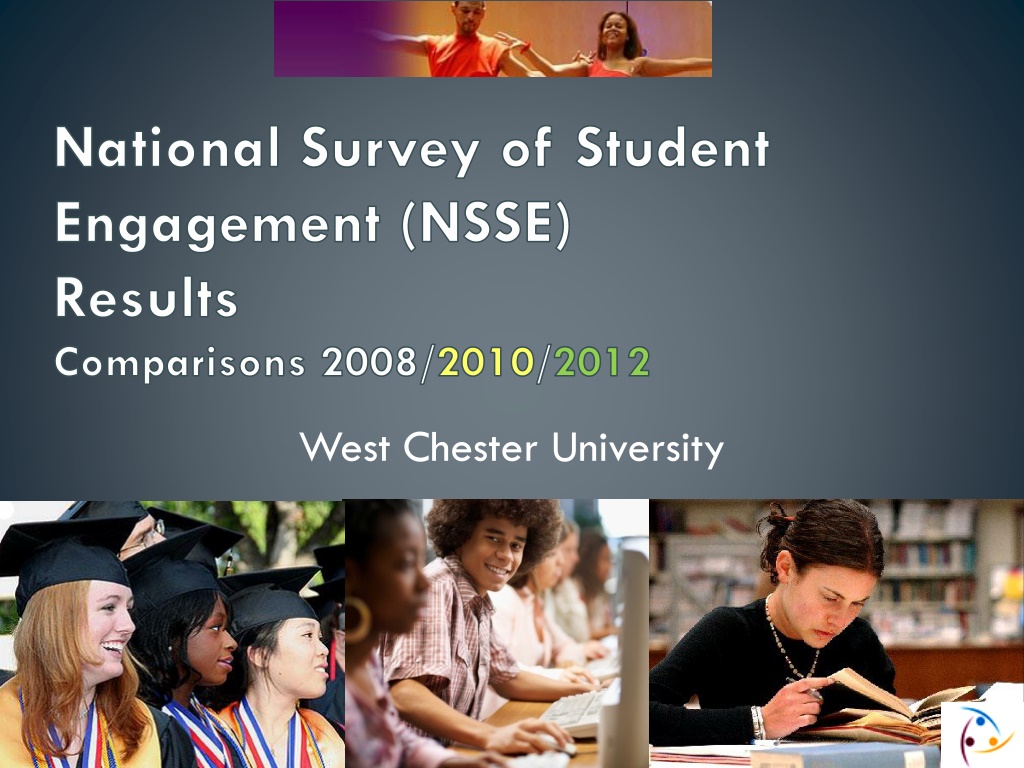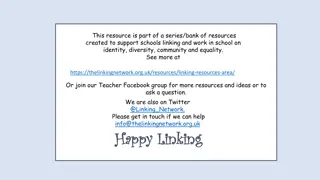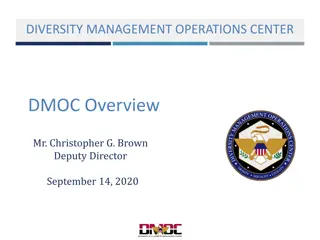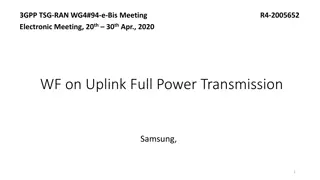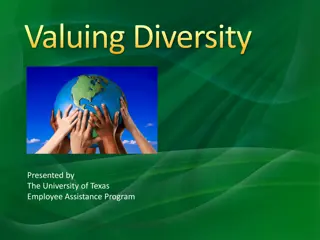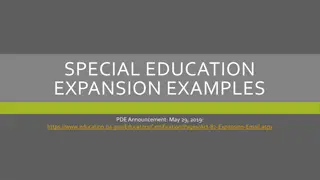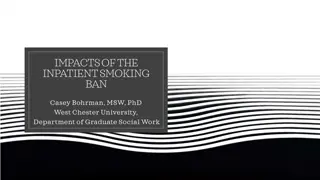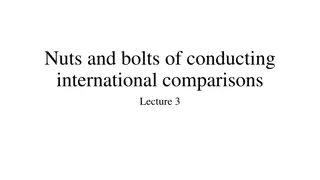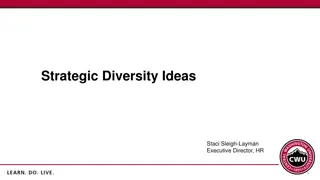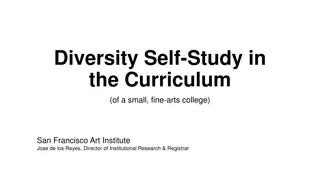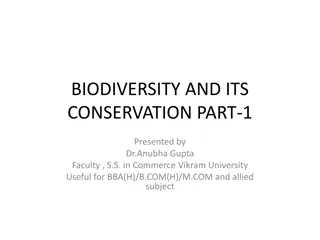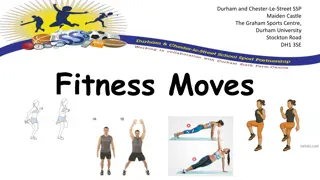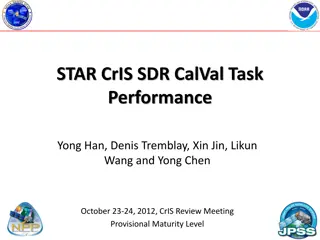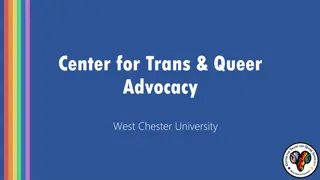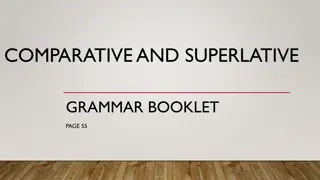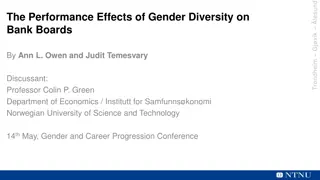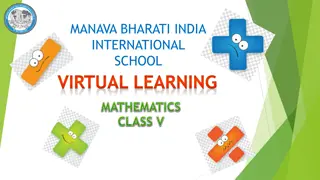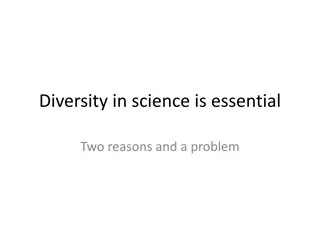NSSE Results Comparisons and Diversity at West Chester University
The National Survey of Student Engagement (NSSE) provides insights into student engagement levels at West Chester University, focusing on aspects such as active learning, academic challenges, and campus support. The diagnostic results help institutions identify strengths and weaknesses to enhance student learning and success. Additionally, senior students at the university frequently engage in conversations with diverse peers, contributing to a more inclusive and globally aware campus environment.
Download Presentation

Please find below an Image/Link to download the presentation.
The content on the website is provided AS IS for your information and personal use only. It may not be sold, licensed, or shared on other websites without obtaining consent from the author. Download presentation by click this link. If you encounter any issues during the download, it is possible that the publisher has removed the file from their server.
E N D
Presentation Transcript
National Survey of Student Engagement (NSSE) Results Comparisons 2008/2010/2012 West Chester University
What is NSSE and What Does it Measure? A survey that provides an annual snapshot of student engagement in programs and activities that institutions provide for their learning and personal development. Results provide an estimate of how undergraduates spend their time and what they gain from attending college. NSSE items represent empirically confirmed good practices ; they reflect behaviors associated with desired outcomes of college. 540 First Year 955 Seniors
NSSE Results Are diagnostic; to help institutions look holistically at undergraduate experience Help pinpoint aspects not in line with mission, or what institution expects Identify weaknesses and strengths in educational programs Help institutions know what to focus on to improve student learning and success
Active & Collaborative Learning Level of Academic Challenge Enriching Educational Experiences Supportive Campus Environment Student Faculty Interaction
Multi-Year Benchmark Comparison First Year 70.0 LAC 60.0 ACL SFI 50.0 EEE 40.0 SCE 30.0 '08 '10 '12 20.0 57.3 LAC 54.5 57.8 10.0 50.7 ACL 48.8 51.4 0.0 41.8 SFI 38.7 43.7 '08 '10 '12 37.6 EEE 33.8 38.5 57.9 SCE 55.4 58.8
Multi-Year Benchmark Comparison Seniors 70.0 LAC 60.0 ACL SFI 50.0 EEE SCE 40.0 30.0 '08 '10 '12 20.0 52.9 LAC 52.0 51.7 10.0 41.7 ACL 42.6 41.4 0.0 33.8 SFI 34.7 32.6 '08 '10 '12 27.6 EEE 27.9 25.3 61.4 SCE 61.1 61.2
How do we do in questions related to diversity? Response from seniors (Often/Very Often) Had serious conversations with students of a different race or ethnicity than your own. Had serious conversations with students who are very different from you in terms of their religious beliefs, political opinions, or personal values. Encouraging contact among students from different economic, social, and racial or ethnic backgrounds. Understanding people of other racial and ethnic backgrounds. WCU Public 55% 52% 55% 54% 50% 51% 54% 55% 46% N/A Diverse perspectives and global citizenship
To what extent WCU prepared you Seniors answering Quite a bit/Very much Writing clearly and effectively Speaking clearly and effectively Acquiring job or work-related knowledge and skills Thinking critically and analytically Solving complex real-world problems Contributing to the welfare of your community Voting in local, state, or national elections Working effectively with others WCU 76% 73% Public 75% 71% 76% 74% 86% 61% 47% 28% 79% 86% 63% 47% 28% 78%
How are doing in preparing our students to work effectively with others? Worked with classmates outside of class to prepare class assignments (Often/very often) FY 33% 31% 34% SY 45% 56% 52% Have worked on a research project with a faculty member outside of course or program requirements FY 6% 3% 3% SY 10% 15% 15% Worked with faculty members on activities other than coursework (committees, orientation, student life activities, etc.) Those answering Never. FY 57% 56% 58% SY 47% 41% 45% 2008 /2010 / 2012
Are we teaching students to make connections and think critically? During the current school year, how often have you (% saying often/very often) FY SY 59% 62% 61% 53% 56% 58% 66% 71% 67% 71% 74% 72% Learned something that changed the way you understand an issue or concept Put together ideas or concepts from different courses when completing assignments or during class discussions 44% 44% 47% 54% 56% 57% Examined the strengths and weaknesses of your own views on a topic or issue. 2008 /2010 / 2012
Study Abroad Plan to or have studied abroad Plan to do FY 37% 34% 33% Have done SY 6% 8% 8% 2008 /2010 / 2012
Use of Technology FY 47% 48% 53% 73% 69% 68% SY 52% 59% 55% 74% 77% 73% Used an electronic medium (listserv, chat group, Internet, instant messaging, etc.) to discuss or complete an assignment WCU has prepared you for using computing and information technology Used a web-based course management system to access the course syllabus, notes or assignments (Blackboard, WebCT, eCollege, etc.) 86% 92% 83% 83% 93% 90% 2008 /2010 / 2012
Exercised or participated in physical fitness activities FY SY Never 11% 11% 9% 12% 11% 12% Sometimes 29% 28% 21% 35% 29% 33% Often/Very 61% 61% 70% 53% 60% 57% 2008 /2010 / 2012
To what extent does WCU help students cope with non-academic responsibilities (work, family, etc.)? FY 40% 38% 34% SY 20% 27% 26% To what extent does WCU provide the support to thrive socially? FY 52% 50% 52% SY 32% 38% 38% (Quite a bit or very much) 2008 /2010 / 2012
Quality of Interactions The quality of relationships with faculty Helpful, available (4-7) FY 90% 94% 91% SY 91% 94% 92% The quality of relationships with administrative personnel and offices Helpful, considerate, flexible (4-7) FY 78% 82% 83% SY 70% 75% 73% The quality of relationships with other students Friendly, supportive, sense of belonging (4-7) FY 93% 90% 92% SY 90% 93% 93% 2008 /2010 / 2012
Advising First-Year Senior-Year 2012 2012 2008 2010 2008 2010 5% 11% Poor 5% 6% 14% 12% 14% 18% Fair 21% 15% 22% 21% 46% 40% Good 51% 50% 39% 42% 35% 30% Excellent 23% 30% 25% 25%
To what extent WCU has emphasized the importance of developing a relationship with an academic advisor who can assist you with your academic, degree and career planning? FY 52% SY 42% Discussed selection of academic majors, minors, or academic concentrations with a faculty or staff member FY 36% SY 35% Discussed career related topics such as internships, resumes, and references with a career services professional, faculty or other staff member FY 21% SY 44%
Progression toward a degree Changed your major (at least once) 37% 39% Delayed your graduation plans because courses were not available when needed (at least once) 28% 31% 2010 / 2012
How would you evaluate your entire educational experience at this institution? Good or Excellent FY Senior 89% 90% 92% 84% 90% 86% 2008 /2010 / 2012
If you could start over again, would you go to the same institution you are now attending? Probably Yes FY 46% / 41% / 38% SY 41% / 40% / 36% Definitely Yes FY 40% / 45% / 50% SY 39% / 44% / 47% 2008 /2010 / 2012
Significance of Means and Effect Size Just because a mean difference is statistically significant doesn t mean that the result is relevant or important. Effect size indicates the practical significance of the mean difference. In practice, an effect size of .2 is often considered small, .5 moderate, and .8 large. A positive sign indicates that WCU s institution's mean was greater, thus showing an affirmative result for us. A negative sign indicates we lag behind the comparison group, suggesting that the student behavior or institutional practice represented by the item may warrant attention. WCU results are very similar to those of other institutions of our type and size. Only one area showed a greater than .2 negative difference: use of technology.
